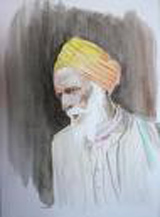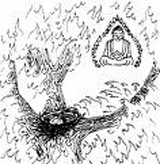Think it over
Evolution of human nature
This story is based on real episodes in the lives of some great spiritual masters of India.
A great sage gave an inspiring discourse on spirituality to a group of people gathered in his house. After the talk was over, a young man from the group approached the sage and said,“Sir, I am very much inspired by your talk. Tell me what I can do to enter into spiritual life.”
The sage looked at the young man with his large, penetrating eyes and replied with a mischievous smile:
“Go and tell lies. Be selfish and worldly.”
The young man and the disciples of the sage sitting around him were perplexed and surprised at the sage’s reply. The young man, not knowing what to say, shifted his body uneasily and nervously. The sage laughed and said:
“Relax young man, I was just joking. But for you to progress in life you have to concentrate more on the worldly rather than on the spiritual life. Be ambitious. Don’t be satisfied with what you are. Aspire for wealth, power, name and fame, success, position and prestige in society. Enjoy life to the full. But earn your wealth and power through honest and legitimate means and use them not only for your self but also for the benefit of the community of which you are a part. Be kind and charitable to your friends and near and dear ones. Help people in distress. But be a Rudra to your enemies. Do not yield meekly to the pressure of people or environment. Fight and conquer the forces or people who oppose you. Never yield to injustice. Be more practical and flexible than idealistic in dealing with people and situations. Fulfil diligently and honestly all your responsibilities to your family and the society. Enjoy the fruits which come as a result of the fulfilment of your duties. Offer all your action, fruits and the enjoyment to God. This is the sādhanā for you.”
The next day the sage was in his house, listening to and answering the difficulties and questions of his disciples. One of the women-disciples recounted the difficulties experienced by her husband, a building contractor, in conducting his business. She said,
“You have told my husband to conduct his business honestly. My husband had a very successful and prosperous business. But from the day he has decided to do his business honestly his fortunes have been on the decline. The present business and government environment is so corrupt it is difficult for an honest businessman to survive. Especially in the business in which my husband is, it is virtually impossible to get a contract without bribing the concerned officials. My husband is struggling hard to keep his business going.”
The sage replied:
“Let him suffer for the sake of principles. Let him give up safety, comfort and enjoyment and embrace anxiety, poverty and failure for the sake of higher values. Let him forsake wealth, power and success for the sake of higher progress.”
The woman-disciple looked at the sage perplexed. The sage spoke again in an uncompromising tone:
“Whatever happens, your husband has to cling to his moral principles. He should not give bribes under any circumstance. He must be truthful and honest in his dealings. And because of this, if your husband goes bankrupt, and he and you and your family have to starve, even then he has to steadfastly cling to his values.”
The woman almost cried,
“What you are preaching is a cruel and impractical idealism.”
The sage, seeing the distress and anxiety in the woman’s eyes, said consolingly:
“Listen dear Vimala, if your husband clings to his values and have faith in God in this hour of difficulty, I can assure you that after some time he will be appreciated and respected by his customers and the business community for his principled stand and he will again prosper in his business. But that is a secondary result. More important is that your husband will make a decisive progress in his evolutionary journey. You have to provide moral and spiritual support to your husband in this hour of difficulty, which is also the hour of progress. In India, in our Sanskrit language, wife is called Saha-dharminī, a co-traveller on the path of Dharma. So you have to help your husband in progressing in the path of Dharma”.
The next day the sage was conversing with his close disciples. His secretary, and a disciple, read a letter of another disciple, Sankar, from a distant land. The disciple, a businessman, writes to his Guru that since the day he took to the life of Sādhanā, he wasdoing his business honestly and truthfully and asks what else he can do to align his business with his spiritual aspiration and sādhanā. The sage remarks laughingly,
“He has to kick off his morality,” and instructs his secretary,
“Write to him he should no more do his business according to the ethical and moral standards of his mind or society. He has to silence his mind and seek the guidance of his soul and do his business according to the dictates of his soul.” One of the disciples asks the sage,
“Sir, I am intrigued by the different ways in which you have dealt with people during the past two days. The day before yesterday, when a young man asked you to initiate him into spiritual life, you told him to concentrate more on the worldly life rather than on the spiritual life. Yesterday to Vimala’s husband, you advised him to cling steadfastly to moral principles. But today you are asking Sankar not to do his business according to moral principles but according to the inner guidance of his soul. What is the cause behind such a vast difference in approach?”
The sage replied,
“They are at different stages of evolution; so, obviously, they cannot be treated in the same way,”
and explained further:
“The young man who came to us a few days back is a child-soul at the first stages of evolution. He is a mass of tamas living in the inertia of his physical or bodily consciousness driven by its instincts and material needs. He is not yet ready for spiritual life or higher moral development. The next immediate goal of his evolution is to progress from an inert physical man, driven by his biological and material needs, to become a dynamic vital man, living in his emotional and pragmatic mind, vitality and will, successfully dealing with the outer life. In this early stage of human development, Nature doesn’t insist on ethics or morality but on the psychological development of the emotional, vital and pragmatic mind. Left to the slow process of Nature, it may possibly take hundreds of births to prepare that young man for the higher moral and spiritual development. But what I have told him is a discipline which will accelerate this natural process of evolution. In fact this is the original aim of the Dharma-śāstras of ancient India, which is to provide a discipline which will accelerate the psychological and spiritual evolution of the ordinary physical man who is at the first, preliminary stage of human development.
“The case of Vimala’s husband belongs to the next stage in human development. He is a rājasic vital man who lives in his well-developed pragmatic mind, vitality and will. For him the next step in evolution is to progress from the rājasic vital man to a sāttwic man governed by his intellectual, ethical and aesthetic mind. So I set him on a path of ethical development. The difficulty he is experiencing in his business is in fact an opportunity to move decisively in this higher line of progress.”
“And our Shankar whose letter Gopal read today belongs to the third stage. Shankar is a sāttwic man with a well-developed mental and moral being and an awakened soul with a spiritual aspiration. He is someone who is ready and prepared to realise his spiritual destiny. He has to make an attempt to rise beyond his mental and moral nature to his spiritual self. For him, if he clings rigidly to the mental and moral notions of his mind or society, it will delay his spiritual progress. In fact it is better for him to stumble, falter and wander around in trying to discover the inner spiritual guidance of his soul rather than to go straight following the mental and moral mentor.”
One of the disciples asked,
“Does it mean that those who are on the first two stages, the tāmasic and rājasic men are not ready for the direct inner guidance of the soul?”
The sage replied:
“We cannot make such rigid generalisation human being is a complex organism which cannot be rammed into a fixed logical process or formula. In general it is not advisable to preach direct inner guidance to a tāmasic or rājasic nature with a weak soul. It may lead to mistaking of the desires and instincts of the body and vital as the inner inspiration. But this may not apply to an awakened soul. It depends on the level of inner awakening of the soul.”
“But the three stages of evolution you have described, do they not refer to the evolution of the human soul?,” asked again the disciple.
“No” replied the sage.
“They are the stages of evolution of human nature, of the body, vital and mind. The evolution of human soul is something different.”
“Do you mean to say that the Soul and Nature follow two distinct lines of evolution?”
“Yes. For the summit of nature, evolution is the full development of the intellectual, ethical and aesthetic mind or in other words sāttwic mentality. But evolution of the soul proceeds beyond the sāttwic mind to the realisation of the spiritual self. When the soul takes a human body its growth corresponds to the evolution of nature, that is, from the tāmasic physical man to the vital rājasic man and from rājasic to the sāttwic man. And each of these steps is a definite progress in the evolution of soul. When the soul attains to the sāttwic nature it has a certain level of inner awakening. But when the soul proceeds further beyond sattwa towards its spiritual destiny, it may not necessarily incarnate in a sāttwic nature; it may take a rājasic or sāttwic or even tāmasic nature depending on the karmic balance to be exhausted, or the type of further experience it wants for its progress or the work or mission it has to do or fulfil. So in this higher stage of evolution, there can be an awakened and advanced soul with a rājasic or even tāmasic nature. But such an awakened soul will not be as much bound to its nature as a soul in the earlier stages of evolution; it can easily detach itself from its own nature, follow a spiritual discipline and attain rapid spiritual progress. This is the psychological basis of the traditional Vedantic idea that a spiritual man or a sage need not necessarily be sāttwic; he can be in his outer nature, inertly tāmasic like the Jada Bhāratha or fiercely rājasic like Durvāsa.”
Mr. M.S. Srinivasan is a sadhak on the path of integral Yoga.
Share with us (Comments, contributions, opinions)
When reproducing this feature, please credit NAMAH, and give the byline. Please send us cuttings.







